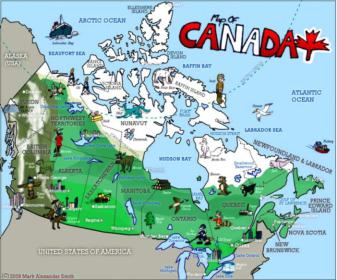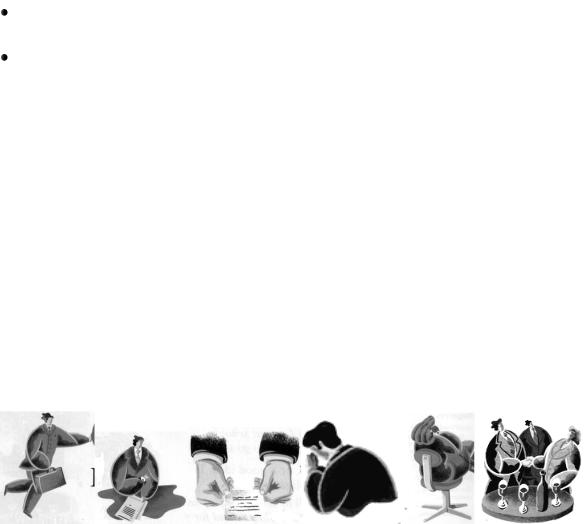
Кудинова Практическиы курс англиыского языка для студентов международник Ч.2 2014
.pdf
like an old hand as you become more familiar with situations and feel well able to cope with new situations based on your growing experience.
5. The 'independence' stage
Differences and similarities are valued and important You may feel full of potential and able to trust yourself in all kinds of situations. Most situations become enjoyable and you are able to make choices according to your preferences and values.
3. Look through the text again and find equivalents to the following words: influence (noun), well-known, definite, to influence sth, surroundings, to be divided into sth, to come to, agitated, inquisitive, embarrassed, lonely, instantaneously, to face, to be aware of, assured, to believe, regarding sth.
4. Read Extract B again and match these descriptions with the five stages. a) You enjoy the social, psychological and cultural differences and feel at home. b) You can now move around the country without a feeling of anxiety.
c) You may begin to criticise the country and the values of the people. d) You are fascinated by all the new sights, sounds, smells and tastes. e) You may feel lonely and have a sense of loss.
5. Discuss the following questions.
1. Have you lived in another culture, or do you know someone who has? What have been your/their experiences with culture shock?
2. What countries have a similar culture to your own? 3. What do you think reverse culture shock might be?
6. Listen to someone talking about his experience of culture shock. What were the main problems he experienced? Before you do the listening task,
make sure you know the following vocabulary units:
bitterly cold, to last for a lifetime, a mild winter day, to go numb, humid, to put up with sth, to adjust to sth, to fit in, to feel like a fish out of water.
7. Listen again. Are the statements true or false?
1.He had culture shock all the time he was in Chicago.
2.He didn't like anything about Chicago.
3.He hated the winter but liked the summer.
4.The cafes were too hot in the summer.
5.He is experiencing culture shock in England at the moment.
6.He knows more about ice hockey than football.
Reading and Speaking: People Who Emigrate
1. Work in small groups and discuss the following questions.
1. Have any of your friends or family gone to live in a foreign country? Why? Do you know anyone who has come to live in your country from another
31

country? Why? Do these people have any problems about living away from home?
2. Close your eyes and think about your country. What would you miss most about it if you went to live abroad? Write a list and compare it with the others in the group.
2. Read the introduction to the article. Divide into two groups. Group A: Read about the Clavy family, who emigrated to Canada. Group B: Read about the White family, who emigrated to Greece.
The Great Escape
Many people move to a new country in search of a new life. Do they always find what they are looking for? Here are the stories of two British families who decided to emigrate.
Canada
The Clavy family and their two dogs, Bonzo and Doodah, moved from the suburbs of Birmingham to Canada two years ago. Marion, a full-time housewife, and Andy Clavy, a mechanical engineer with a machine supply company, now live with their two children, Matthew, 12, and Mark, 9, in Stony Plain, Alberta, not far from the Rocky Mountains.
Marion: I still can't believe we're actually here. Do we really live in this big house, surrounded by fir trees, on four acres of land, just three hours' drive from the Rockies? It's the most spectacular scenery I've ever seen. It is not that life in Birmingham was so bad. We were comfortably well-off, but Andy worked 12hour days. He used to come home every night, have a shower, eat dinner, then crash out. I thought, 'There must be more to life than this!' We rarely spent time together as a family.
Then Andy was made redundant and given a pay-out of more than £20,000, so we took the plunge. We had always wanted to live in Canada, ever since we'd visited cousins here, so we applied. Our application took a nail-biting eighteen months to be accepted and it cost £2,000. Then we sold our house, a semi with a pocket-handkerchief garden. Emigrating is an expensive business. It cost £1,000 just to fly the dogs here!
We didn't know a soul when we arrived in Alberta, but in just a few months we had made plenty of Canadian friends. It took time for us to get used to the way they come into your house and use the telephone and take drinks from the fridge without asking. But I'm less English about such things now.
32
Moving to Canada has made us a lot closer as a family. We do sports together, visit friends' houses for barbecues, and go sightseeing in the Rockies. The children love their schools. They think it's great not to have to wear a uniform. And the girls go mad for Matthew here because of his English accent - the phone never stops ringing!
I don't miss much about England, except the castles and the greenness of the countryside, but now we have the Rocky Mountains. I certainly don't miss the English weather. Even in the winter here, when the temperature is -45 degrees, the sun usually shines and the sky is blue.
Andy: Before we moved, I was always too exhausted to do anything with Marion and the boys. Now I only work eight-hour days. Marion and I have much more time for each other. Business is a lot more relaxed, too. You don't wear suits and ties, and nobody calls anybody 'Mr'. It's all first names and T- shirts and jeans. It took a few months to find a decent job, so for a while we had financial worries. But in the end I was lucky. Unemployment here is quite high.
I don't miss anything about England except the cricket, and of course my family, but my parents have already visited us twice. My sisters are staying with us at the moment and having a great time. Moving here is the best thing we've ever done.
Greece
Hazel and Barry White left England five years ago with their baby daughter, Daisy. They moved from their basement flat in north London to a twobedroom apartment overlooking the sea on the Greek island of Agastri. They earned about £18,000 between them in London, working in the hotel business. They have set up a watersports business in Greece.
Barry: Daisy was three months old when I decided we simply had to leave London. We weren't unhappy in London, we enjoyed our work. But we worried that our child couldn't run freely in the busy London streets. We wanted her to grow up carefree and in the sunshine.
Hazel and I had had a couple of holidays in Agastri and had made some Greek friends there. It's very beautiful and peaceful. In Greek, agastri means 'fishing hook', and the locals say, 'When you come to Agastri, you're hooked.' So we took the plunge, sold our flat, and moved. Our family and friends thought we were crazy.
A tourist sports business seemed a good way to earn a living in Greece, so with the money from our flat we bought waterskiing equipment and two speedboats. Later, I bought a varka or passenger boat for fishing trips and picnics round the island. Running the business hasn't been easy. Things are very bureaucratic here and sometimes this can be very frustrating. It took some time to get used to so many forms and officials, but I'm more patient now.
33

Also, I've found the Greek language very difficult. Fortunately, I understand more than I can speak, so I get by. But Daisy is more Greek than English now. She's absolutely bilingual and the only English child at her school. Living on Agastri is definitely better for her. She runs round the village and talks to everyone. Everyone knows her.
I don't miss England much, mainly family and friends. I do miss the theatre but we get good movies here. I also miss sausages, Stilton cheese, and white thicksliced bread! But that's all. I think Hazel has found it more difficult than me.
Hazel: I didn't realize what a big culture shock it would be. It has taken me a long time to get used to the Greek way of life, especially on such a small island. Here the women aren't treated the same way as men. They are expected to stay at home more, and in the winter they hardly go out at all. But people are very kind and generous. In a way, the community is like a big happy family, which is great, especially for Daisy, but it also means that everyone knows everything about you.
I have a few Greek women friends, but the language barrier was very hard at first. I used to visit their homes for coffee and sit for hours not understanding a single word. Our life here has certainly tested my relationship with Barry. The business has had some bad times. There's such a huge difference between our winter and summer income, and money worries cause our tempers to fray! Next winter, I'm going back to London for a few months with Daisy - I miss my parents terribly. No doubt I'll be back here with Barry in the spring, but I'm not entirely sure. I sometimes have doubts about living here.
3. Answer the questions about the family in your article.
1.Why did they emigrate?
2.Why did they go to that particular country?
3.What are the changes in the way of life for the parents?
4.What are the changes in the way of life for the children?
5.Were there any initial difficulties?
6.Have they had any money problems? Are they any better-off now?
7.Is the family happier?
8.What do they miss about their life in England?
9.How is the relationship between the husband and wife?
10.Do they still think that moving was a wise decision?
4.Find a partner from the other group. Compare your answers.
5.Read about the other family. Which family do you think has made the more successful move? Would you like to experience their new way of life?
34
6. Here are some sentences from the stories of two families. Can you work out the meaning of the words underlined? Explain the meanings in your own words.
Canada
1.Marion, a full-time housewife…
2.He used to come home every night, have a shower, eat dinner, and crash out.
3.Andy was made redundant and given a pay-out of more than £20,000.
4.Our application took a nail-biting eighteen months to be accepted.
5.Then we sold our house, a semi with a pocket-handkerchief garden.
6.We didn't know a soul when we arrived.
Greece
7.We wanted her to grow up carefree and in the sunshine.
8.So we took the plunge, sold our flat, and moved.
9.Things are very bureaucratic here and sometimes this can be very frustrating.
10.Fortunately, I understand more than I can speak, so I get by.
11.I didn't realize what a big culture shock it would be.
12.Here the women aren't treated the same way as men.
13.They are expected to stay at home more, and in the winter they hardly go out at all.
14.Money worries cause our tempers to fray.
7. Use a question word in A and a verb in B to write some questions about
the family you first read about.
Example: Why did they decide to emigrate?
when, where, who, what, why, how, how |
move, live, work, be, go, do, miss, visit, |
long |
decide, feel, have |
8. Write a list of as many disadvantages as you can think of for emigrating. Compare your lists. For every disadvantage (-) try to find an opposing
advantage (+).
Example: - The language barrier - maybe you don't speak the language. + But this is an opportunity to learn a new language.
Reading: A World Guide to Good Manners
1. Read the text and find English equivalents to the following Russian words and expressions: "мировая деревня", прийти точно вовремя, Европейское сообщество (ЕС), предполагать, познакомиться поближе, во время телефонного разговора, ступни ног, верх неприличия, публичное оскорбление, прилюдно сморкаться, заключать деловое соглашение, визитка, свод правил, сделать что-либо не торопясь, пожать руки, кланяться, непринужденный, подмигивать, оскорбительный, соответствовать кому-то (не отставать от кого-то), сложить руки.
35

Travelling to all corners of the world gets easier and easier. We live in a global village, but how well do we know and understand each other? Here is a simple test. Imagine you have arranged a meeting at four o'clock. What time should you expect your foreign business colleagues to arrive? If they're German, they'll be bang on time. If they're American, they'll probably be 15 minutes early. If they're British, they'll be 15 minutes late, and you should allow up to an hour for the Italians.
When the European Community began to increase in size, several guidebooks appeared giving advice on international etiquette. At first many people thought this was a joke, especially the British, who seemed to assume that the widespread understanding of their language meant a corresponding understanding of English customs. Very soon they had to change their ideas, as they realized that they had a lot to learn about how to
behave with their foreign business friends.
For example:
The British are happy to have a business lunch and discuss business matters with a drink during the meal; the Japanese prefer not to work while eating. Lunch is a time to relax and get to know one another, and they rarely drink at lunchtime.
The Germans like to talk business before dinner; the French like to eat first and talk afterwards. They have to be well fed and watered before they discuss anything.
36

Taking off your jacket and rolling up your sleeves is a sign of getting down to work in Britain and Holland, but in Germany people regard it as taking it easy.
American executives sometimes signal their feelings of ease and importance in their offices by putting their feet on the desk whilst on the telephone. In Japan, people would be shocked. Showing the soles of your feet is the height of bad manners. It is a social insult only exceeded by blowing your nose in public.
The Japanese have perhaps the strictest rules of social and business behaviour. Seniority is very important, and a younger man should never be sent to complete a deal with an older man. The Japanese card almost needs a rulebook of its own.
You must exchange business cards immediately on meeting because it is essential to establish everyone's status and position.
When it is handed to a person in a superior position, it must be given and received with both hands, and you must take time to read it carefully, and not just put it in your pocket! Also the bow is a very important part of greeting someone. You should TO not expect the Japanese to shake hands. Bowing the head is a mark of respect and the First bow of the day should he lower than when you meet thereafter.
The Americans sometimes find it difficult to accept the more formal Japanese manners. They prefer to be casual and more informal, as illustrated by the universal 'Have a nice day!" American waiters have a one-word imperative 'Enjoy! ' The British, of course, are cool and reserved. The great topic of conversation between strangers in Britain is the weather – unemotional and impersonal. In America the main topic between strangers is the search to find a geographical link. 'Oh, really? You live in Ohio? I had an uncle who once worked there. '
'When in Rome, do as the Romans do.'
Here are some final lips for travellers.
In France you shouldn't sit down in a cafe until you've shaken hands with everyone you know.
In Afghanistan you should spend at least five minutes saying hello. In Pakistan you mustn't wink. It is offensive.
In the Middle East you must never use the left hand for greeting, eating, drinking, or smoking. Also, you should take care not to admire anything in your hosts' home. They will feel that they have to give it to you.
In Russia you must match your hosts drink for drink or they will think you are unfriendly.
37

In Thailand you should clasp your hands together and lower your head and your eyes when you greet to someone.
In America you should cat your hamburger with both hands and as quickly as possible. You shouldn't try to have a conversation until it is eaten.
3. Read the article again and answer the questions. Discuss the questions in pairs.
1.Which nationalities are the most and least punctual?
2.Why did the British think that everyone understood their customs?
3.Which nationalities do not like to eat and do business at the same time?
4.'They (the French) have to be well fed and watered." What or who do you normally have to feed and water?
5.An American friend of yours is going to work in Japan. Give some advice about how he/she should and shouldn't behave.
6.Imagine you are at a party in (a) England (b) in America. How could you begin a conversation with a stranger? Continue the conversations with your partner.
7.Which nationalities have rules of behaviour about hands? What are the rules?
8.Look at the pictures. What nationality are they? How do you know?
9.Why is it not a good idea to:
...say that you absolutely love your Egyptian friend's vase.
... go to Russia if you don't drink alcohol.
... say 'Hi! See you later!" when you're introduced to someone in Afghanistan.
... discuss politics with your American friend in a McDonald's.
4.Do you agree with the saying 'When in Rome, do as the Romans do'? Do you have a similar saying in your language?
5.What are the 'rules' about greeting people in your country? When do you shake hands? When do you kiss? What about when you say goodbye?
6.What advice would you give somebody coming to live and work in your country?
7.Translate the following sentences into English:
1.Я полагаю, он придет вовремя? – Ха-ха-ха! Когда ты узнаешь его получше, ты поймешь, что он никогда не торопится. – Но это же верх неприличия!
2.Европейское сообщество – важнейшая часть «мировой деревни».
3.Мне стыдно выходить с тобой в свет – ты прилюдно сморкаешься, кладешь ноги на стол, показывая ступни ног, не пожимаешь руки
38
знакомым мужчинам, подмигиваешь незнакомым женщинам… Отвратительно!
4.Расслабься! Веди себя непринужденно! Не привлекай ненужного внимания!
5.Сложи руки и поклонись. Потом отдай им визитку и переходи к заключению делового соглашения, как ни в чем не бывало.
6.Ему нет равных в стрельбе.
7.Каждый студент должен изучить свод правил университета, прежде чем приступить к учебе.
8.Я не собираюсь разговаривать в таком тоне. Ты ведешь себя оскорбительно!
Reading: Russia and Russian Culture
1. Read the text and say whether you agree or disagree with what it says about Russia and Russian culture. Use the matching task to help you understand the text better.
1. be taken in by |
a. недостаток, дефект |
2. to run sb down |
b. рассматривать |
3. shortcoming |
c. неприязненный, завистливый |
4. to foresee the consequences |
d. склонность, тенденция |
5. to rely on “something turning up” |
e. 1) бланк, 2) прилежание, старание |
6. inclination |
f. скрупулезность, тщательность |
7. to regard |
g. сформировать костяк |
8. grudging |
h. быть обманутым чем-л. |
9. on the dot |
i. окутанный смогом |
10. application (uncount.) |
j. точно в срок, минута в минуту |
11. thoroughness (uncount.) |
k. предвидеть последствия |
12. contortionist |
l. "человек-змея", акробат |
13. to form the backbone |
m. сходство, зд. духовное родство |
14. affinity (uncount.) |
n. пренебрежительно отзываться о |
15. smog-ridden |
o. полагаться на авось |
Russia and Russian Culture
The Russian attitude to themselves is summed uр in one of their many pithy, earthy proverbs: “My country may be a smelly dungheap - but it's my
smelly dungheap.”
Even though they always expect the worst to happen, the Russians firmly believe that, as a nation, they are destined to save the world. This is nothing whatever to do with the Revolution. This is something they have believed since
the 16th century monk, Filofei, described Moscow as “the third Rome, and there
will be no fourth”.
The Russians would like to be seen above all as being capable of running things smoothly while keeping their personal dignity intact. “The trouble with us
39
is that we all have a serf mentality,” Moscow intellectuals frequently muse. The playwright Chekhov talked of his lifelong struggle to “squeeze the slave out of
my soul”. This is sometimes misread by people in a hurry as “squeeze the SLAV out of my soul” — impossible and undesirable, of course.
The Russians think of themselves as expansive, generous, open-minded, peace-loving and sincere.
They will occasionally adopt a jocular, dismissive tone about themselves to test a stranger's attitude to them. One should not be taken in by this. They run themselves down but get angry if others criticize their shortcomings.
On the negative side, they recognise that they аrе lazy and not inclined to look ahead or foresee the consequences of their actions. Like Dickens' Mr.
Micawber, there is a national inclination to rely on “something turning up”.
Their leaders were still boasting that not a single German jackboot would ever touch Russian soil when divisions of the German army were already hundreds of miles inside the Russian border, within striking distance of Minsk, Kiev and St. Petersburg.
Despite the rather poor record of the Germans this century (invading
Russia, hanging men, women and children as “examples” on their way in, and so on) the Russians regard the Germans with pity mixed with a grudging admiration. They rather respect them, and think of them as dependable and reliable. Fancy getting up every day and getting to work on the dot and working right through to 5 p.m. Order, application, thoroughness, finishing things — these are all qualities that Russians admire like other people might admire a contortionist in a circus. It’s all quite extraordinary, but of course one wouldn’t want to behave like that oneself. Germans settled widely in Russia in the 19th century, and formed the backbone of the shopkeeping class in St. Petersburg.
The Russians make fun of Americans behind their backs. They cannot understand how such a naïve, poorly educated and stupid nation can be so rich.
They regard the success of American industry as inexplicable and unjust.
The French are categorised as fickle, elusive, unreliable, strange and ludicrous. They are known as frog-eaters (lyagushatniki). Traditionally, ruined French aristocrats were hired as tutors and governesses by good Russian families.
The Russians have a sentimental affinity with the English. They refer slightly ironically to “good old England”. It is known that the English make good shoes and umbrellas, and they like to imagine that London is still populated by men in top hats strolling about the smog-ridden streets which all Russians know about through their reading of Dickens and Thackeray.
Apart from their pubs, the Russians admire the English capacity for drink. In a story by Gorki, a group of Russian and English merchants agree to stage a drinking match on board a barge floating down the Volga. The last message
40
